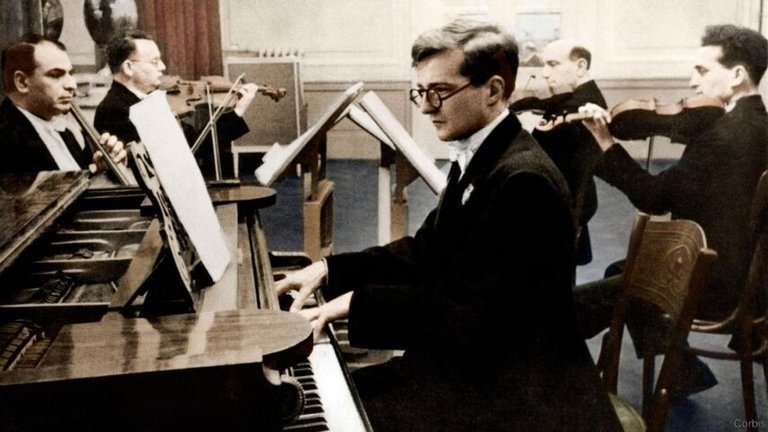
On the same day as Stalin died Sergei Prokofiev. The whole neighborhood around his apartment was already blocked due to Stalin's death honors, so Prokofiev couldn't get a funeral car. His students carried the coffin out of the house, and then carried him all the way to the House of Composers. Moscow is big, the road was long, and they were constantly passing by the columns that were heading towards Red Square, regretting the incredible death of Stalin. Occasionally they were apologizing, fearing that their drab suitcase does not act as a mockery.
It was cold in the basement of the House of Composers, and there was no world. There were no flowers: every Moscow flower was supposed to be in the Hall of the Pillars that day. Dmitri Shostakovich approached the stage, bent down and kissed the deceased: "I'm proud that I was lucky to live and work next to such a great musician as Sergei Prokofiev." In the funeral procession, there were dozens of people. Among them Shostakovich. If someone had died on a more convenient day, Prokofiev would be sent to eternity by hundreds of thousands of Soviets.

The next day he didn't know what would happen.
Nineteen years earlier, one winter morning, he was standing in front of a newspaper kiosk. When he came to order and bought Justice, he immediately opened the third page, and almost collapsed when he saw the title: "Confusion instead of music". The subtitle was: "about the opera Lady Macbeth of the Mtsensk District. He stumbled upon reading the first sentences. Someone from the paper line gave him something, thinking he was drunk early in the morning.
It was an unsigned editorial comment, in which, among other things, stood:
"From the first moment of listening to the opera, a particularly inconsistent, surge of sounds is astounding. Music shakes, barks, sighs, bustles, so as to show the more natural scenes of love. And love is scattered throughout the opera in the most vulgar way. (...) This music was intentionally made upside down, so that nothing would resemble classical music, there was nothing in common with the sounds of the symphony, with an ordinary accessible music."
It was not just a musical, but rather a death sentence. It was not known who wrote it, nor what consequences will it cause. But Stalin was a very musical man - true, of a devious, undeveloped taste. And yes, he was at the premiere of Shostakovich's opera.

The next 1937, was a year of great cleansing, and Shostakovich was in total disgrace. His music was banned, including the once highly praised First Symphony. Poets, actors, theatrical directors, mostly those who would have been on a better voice than Shostakovich, went to the camps. Maxim Gorky also died, under circumstances that were not completely clear. For him, a special issue of Justice was printed every day, in a single copy, with news that will not hurt the great writer.
Ten years later, in the spring of 1946, Stalin illuminated Shostakovich with his grace and material goods. Beria personally tells him that he has been given a big apartment in Moscow, a holiday villa, a car and sixty thousand rubles. Shostakovich somehow tried to avoid all that honor, but in vain. He looked around him and knew well that sometimes those who Stalin rewarded one day, the next day could vanish. He cheated them to finish them.
Four and a half years earlier, those terrible winters in 1941 to 1942, while the siege of Leningrad took place, Shostakovich composed the Seventh Symphony.
He was evacuated at the beginning of December, and from home he only took notes from Lady Macbeth of the Mtsensk District and his transcription of the score for the Seventh Symphony of Igor Stravinsky. It seemed to him the most important, everything else remained in Leningrad.
The next week he will finish his most famous symphony, which will be performed on March 5, 1942. The score of the Seventh Symphony will be sent to New York, and then performed as a sort of report on the city's siege. Little did it affect to change the mood of Roosevelt's America toward the Soviet Union. Stalin's propaganda was without any effect, Americans didn't understand Russian poets, but this was a big, undefeated music. In a sense, the last great music of our history and our century. Shostakovich was the last composer to write music that aims to be beautiful.
Note: This was my translation from Croaian to English from PULSE article ''Dimitrij Šostakovič: Simfonija Otpora by Miljenko Jergović
asome history
Thank you for this. Loved it :)
thank you for reading!
cheers!@aravindakshan
Interesting story. I can only imagine the fear of attending your friend's funeral while everybody else runs to pay respects to Stalin.
(a great trivia Shostakovich worked briefly as a football judge :D )@heymattsokol, Barnes wrote a great book about Shostakovich, if you're interested in his story: https://www.amazon.co.uk/Noise-Time-Julian-Barnes/dp/1910702609
Wow this cool guy. I like this with your post